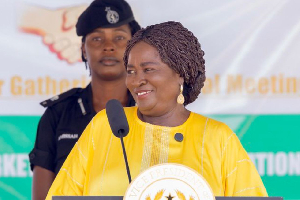Ghana has become second after Belgium, to deliver her first baby through “The Walking Egg – In-Vitro Fertilisation” (TWE IVF) method.
The pregnancy and delivery of the baby boy, at the Pentecost Hospital at Madina in Accra was achieved after three attempts by the couple.
The baby boy, weighing 3.3 kilogrammes brought great relief and happiness to his parents, who had tried for eight years to get a child as well as their friends and relations who thronged the Hospital to witness the procedure.
The TWE technology is one of the in-vitro fertilisation (IVF) methods under which the sperm of the man and the egg of the woman are fertilised outside the womb between two to five days, after which the egg is given back to the woman to carry through pregnancy till delivery.
Developed by a team of Belgian fertility experts, led by Professor Willem Ombelet, the technology has become one of the three forms of fertility treatment through which 83 babies have been delivered in Belgium where it originated.
The others, namely intra-uterine insemination (IUI) and intra-cervical insemination (ICI), are more widely spread in countries including the United Kingdom.
The Medical Administrator of the Pentecost Hospital, Dr Gordon Nii Armah Attoh, told the media, the Hospital worked in collaboration with the team in Belgium to introduce the affordable TWE IVF, which unlike other conventional ones, had minimal medication for stimulation and did not require sophisticated medication to achieve success.
According to Dr Attoh, though the cost could be different from other methods, the TWE method was relatively made cheaper for the clients as the facility organised the process in groups, adding that there were plans to advance the technology with the introduction of other methods of treatment to help couples in need of children in future.
He described the method as historical saying the IVF method used the minimal stimulation method, resulting in very few drug intake, thereby reducing the cost to peg it at about GH¢6,000.00 for drugs and treatment as against GH¢20,000.00 for the conventional method.
In addition, Dr Atto said, the method was cheaper because there was no need for the clients to be admitted because of the insemination, saying, “Once we put the baby into your womb, you lie here for a period and you can resume your normal duties”.
He however hinted that those who already had two children may not have the chance because there was the need to give the opportunity to the childless.
The Chief Executive Officer (CEO) of the Association of Childless Couples of Ghana (ACCOG) Nana Yaw Osei said the TWE was introduced in the country at the maiden edition of the affordable IVF Fertility Treatment Conference organised by the Association in 2015.
With the determination of the Association and support by the Hospital, Ghana now stands tall as the second country to achieve the feat, according to the CEO.
Nana Osei who is also a fertility counselor, said the Association in agreement the hospital reduced the cost for the TWE from GH¢20,000.00 per cycle to about GH¢6,000.00 to make it affordable for all childless couples and called for assistance in support of the initiative to meet the needs of a greater number of people.
In an interview with the Ghana News Agency, the parents who declined to be named expressed great joy with the achievement.
“We are excited to have a baby now after long years of waiting”,the father said, adding, we have been waiting to be blessed with a child for eight years.
Health News of Tuesday, 8 August 2017
Source: GNA













